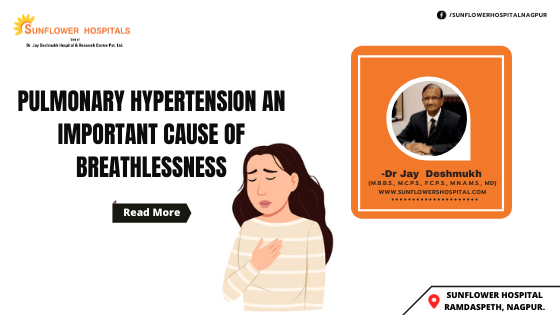Why does pulmonary hypertension occur?
The cells that line the inside of pulmonary arteries swell up. This further leads to swelling of the vessels from inside and ultimately leads to narrowing of the pulmonary arteries. The pulmonary arteries arise from the right chamber of the heart. The narrowing causes increase strain on the right-sided heart chambers, ultimately resulting in swelling of these chambers. The smooth muscles lining the pulmonary arteries contract and grow more than is normal and narrow the pulmonary arteries.
What are the symptoms of pulmonary hypertension?
Fatigue, shortness of breath, initially with exercising and later even at rest are the main symptoms. Chest pain, fainting spells, palpitations, chest pressure, or dizziness are common. Swelling in the ankles, legs and eventually, the abdomen is a late symptom. Some may get blue lips and nails known as cyanosis.
What are the main causes of pulmonary hypertension?
Chronic obstructive lung disease generally caused by long-term smoking is the main cause. Fibrosis of the lungs and obesity causing obstructive sleep apnoea is common too. HIV infection, heart problems at birth, chronic liver disease, and autoimmune diseases like lupus, rheumatoid arthritis, and scleroderma can cause hypertension is thus very important.
What are the complications of pulmonary hypertension?
Enlargement of the right-sided chambers of the heart followed by their failure to function optimally is a serious complication. Irregular beating of the heart, blood clots in the arteries of the lungs, blood in sputum on coughing, and poor outcomes after anesthesia for any surgery are common. Sudden cardiac arrest can occur too. Pulmonary hypertension occurs when the blood pressure in the arteries of the lungs becomes abnormally high due to the narrowing of the vessels going to the lungs. This could strain the right side of the heart and lead to heart failure. pulmonary hypertension. Blood clots in the lungs can cause pulmonary hypertension. The disease of the mitral valve of the heart is common in our country This is a common cause of pulmonary hypertension.
Can high blood pressure cause pulmonary hypertension?
This indeed is a common cause. Hypertension leads to an increase in the pressures of the left chambers of the heart. This leads to an increase in the pressure in the pulmonary arteries. Ultimately hypertension can lead to failure of both sides of the heart. Control
How to diagnose pulmonary hypertension?
A proper clinical examination, X-ray of the chest, ECG, echocardiogram, mt. Min blood tests, CT scans of the chest, lung function tests, and sleep studies can all help to diagnose pulmonary hypertension and assess the severity. These tests also help to see the response to treatment.
What is the treatment?
Primarily treatment of the cause is essential. This may include stopping smoking, reducing weight, treatment of autoimmune disorders with immunosuppressants,
using blood thinners, and oxygen as the mainstay of treatment. Drugs to treat heart failure and medications to relax the smooth muscles of pulmonary arteries and fibrosis in the lungs are important. Treatment for pulmonary hypertension is a challenging experience both for the doctor and the patient.
What about surgical therapies?
If present blood clots in the lungs can be surgically removed by thrombostiction, surgery for mitral valves and holes in the septum of the heart is commonly done. fin appropriate cases lung transplant may be required. Those patients who have both lung and heart failure may be considered for heart and lung transplantation.
How to prevent pulmonary hypertension?
Regular physical activity, avoiding obesity, proper control of hypertension and connective tissue disorders and treatment of congenital heart disease, mitral valve disease, avoiding smoking, and appropriate treatment of COPD and other chronic lung diseases are necessary. Using anti-blood-clotting medications may be beneficial. Pulmonary hypertension is a difficult disorder to diagnose in the early stages. One cannot cure it in most cases, timely diagnosis and treatment will mitigate the symptoms in many cases though life expectancy may be reduced.
Author: Dr Jay Deshmukh
Dr Jay Deshmukh is Chief Physician and Director, Sunflower Hospital, Nagpur Honorary Physician to Honorable Governor of Maharashtra and PondicherryCentral. Dr Jay Deshmukh is an M.B.B.S., M.C.P.S., F.C.P.S., M.N.A.M.S., MD From Internal Medicine – Bombay and New Delhi.


